Artesunate
Product Code:
AG-CN2-0469
AG-CN2-0469
Antibody Isotype:
n/a
n/a
Antibody Clone:
n/a
n/a
Regulatory Status:
RUO
RUO
Shipping:
Ambient
Ambient
Storage:
-20°C
-20°C
No additional charges, what you see is what you pay! *
| Code | Size | Price |
|---|
| AG-CN2-0469-M100 | 100 mg | £55.00 |
Quantity:
| AG-CN2-0469-M500 | 500 mg | £145.00 |
Quantity:
| AG-CN2-0469-G001 | 1 g | £250.00 |
Quantity:
Prices exclude any Taxes / VAT
Stay in control of your spending. These prices have no additional charges, not even shipping!
* Rare exceptions are clearly labelled (only 0.14% of items!).
* Rare exceptions are clearly labelled (only 0.14% of items!).
Multibuy discounts available! Contact us to find what you can save.
This product comes from: Switzerland.
Typical lead time: 7-10 working days.
Contact us for more accurate information.
Typical lead time: 7-10 working days.
Contact us for more accurate information.
- Further Information
- Documents
- References
- Related Products
- Show All
Further Information
Alternate Names/Synonyms:
Artesunic acid; Qinghaozhi
Appearance:
White solid.
CAS:
88495-63-0
EClass:
32160000
Form (Short):
liquid
Handling Advice:
Keep cool and dry.Protect from light.Protect from moisture and oxygen.
InChi:
InChI=1S/C19H28O8/c1-10-4-5-13-11(2)16(23-15(22)7-6-14(20)21)24-17-19(13)12(10)8-9-18(3,25-17)26-27-19/h10-13,16-17H,4-9H2,1-3H3,(H,20,21)/t10-,11-,12+,13+,16-,17-,18-,19-/m1/s1
InChiKey:
FIHJKUPKCHIPAT-AHIGJZGOSA-N
Long Description:
Chemical. CAS: 88495-63-0. Formula: C19H28O8. MW: 384.4. Semi-synthetic derivative of artemisinin originally isolated from Artemisia annua. Semi-synthetic derivative of artemisinin. Anti-malaria. Anti-schistosomiasis. Inhibitor of human cytomegalovirus (CMV). Apoptosis inducer. Anti-cancer. Immunosuppressant. Inhibits production of tumor necrosis factor-alpha (TNF-alpha), interleukin-6 (IL-6), monocyte chemotactic protein-1 (MCP-1) and nitric oxide (NO).
MDL:
MFCD00866204
Molecular Formula:
C19H28O8
Molecular Weight:
384.4
Package Type:
Vial
Product Description:
Semi-synthetic derivative of artemisinin. Anti-malaria. Anti-schistosomiasis. Inhibitor of human cytomegalovirus (CMV). Apoptosis inducer. Anti-cancer. Immunosuppressant. Inhibits production of tumor necrosis factor-alpha (TNF-alpha), interleukin-6 (IL-6), monocyte chemotactic protein-1 (MCP-1) and nitric oxide (NO). Functional ARX inhibitor. Enhancer of GABAA signalling. Targets Gephyrin. Inducer of glucose-6-phosphate dehydrogenase (G6PDH) activity (25fold), the rate limiting enzyme of the pentose phosphate pathway (PPP). Sown to have anti-SARS-CoV-2 activity with an EC50 of 12.98 ? 5.30µM, and beeing potentially useful in the treatment of COVID-19.
Purity:
>98% (HPLC)
SMILES:
[H][C@@]12CC[C@@H](C)[C@]3([H])CC[C@]4(C)OO[C@@]13[C@]([H])(O[C@@H](OC(=O)CCC(O)=O)[C@@H]2C)O4
Solubility Chemicals:
Soluble in DMSO or ethanol. Sparingly soluble in aqueous buffers.
Source / Host:
Semi-synthetic derivative of artemisinin originally isolated from Artemisia annua.
Transportation:
Non-hazardous
UNSPSC Category:
Natural Products/Extracts
UNSPSC Number:
12352200
Use & Stability:
Stable for at least 1 year after receipt when stored at +4°C.
Documents
References
The antimalarial and toxic effect of artesunate on animal models: J. Tradit. Chin. Med. 2, 99 (1982) | Prevention of red cell lysis in artesunate-treated rats: A role for glucose-6-phosphate dehydrogenase: T.M. Salman; Afr. J. Biotech. 8, 139 (2008) | Efficacy of praziquantel and artemisinin derivatives for the treatment and prevention of human schistosomiasis: a systematic review and meta-analysis: R. Liu, et al.; Parasit. Vectors 4, 201 (2011) | Evaluation of the immunosuppressive activity of artesunate in vitro and in vivo: T. Li, et al.; Int. Immunopharmacol. 16, 306 (2013) | Inhibition of human cytomegalovirus replication by artemisinins: effects mediated through cell cycle modulation: S. Roy, et al.; Antimicrob. Agents Chemother. 59, 3870 (2015) | Repurposing the anti-malarial drug artesunate as a novel therapeutic agent for metastatic renal cell carcinoma due to its attenuation of tumor growth, metastasis, and angiogenesis: D.E. Jeong, et al.; Oncotarget 6, 33046 (2015) | Artemisinins target GABAA receptor signaling and impair alpha cell identity: J. Li, et al.; Cell 168, 86 (2017) | Anti-SARS-CoV-2 Potential of Artemisinins In Vitro: R. Cao, et al.; ACS Infect. Dis. 6, 2524 (2020)
Related Products
| Product Name | Product Code | Supplier | Artemisinin | AG-CN2-0467 | AdipoGen Life Sciences | Summary Details | |||||||||||||||||||||||||||||||||||||||||||||||||||||||||||||||||||||||||||||||||||||||||||||
|---|---|---|---|---|---|---|---|---|---|---|---|---|---|---|---|---|---|---|---|---|---|---|---|---|---|---|---|---|---|---|---|---|---|---|---|---|---|---|---|---|---|---|---|---|---|---|---|---|---|---|---|---|---|---|---|---|---|---|---|---|---|---|---|---|---|---|---|---|---|---|---|---|---|---|---|---|---|---|---|---|---|---|---|---|---|---|---|---|---|---|---|---|---|---|---|---|---|---|---|
| Dihydroartemisinin | AG-CN2-0468 | AdipoGen Life Sciences | Summary Details | ||||||||||||||||||||||||||||||||||||||||||||||||||||||||||||||||||||||||||||||||||||||||||||||||



